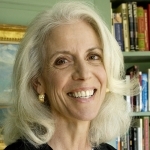 (HOST) Fireworks are traditional on the 4th of July, and commentator Susan Cooke Kittredge has been reflecting on our complicated relationship with fire.
(HOST) Fireworks are traditional on the 4th of July, and commentator Susan Cooke Kittredge has been reflecting on our complicated relationship with fire.
(KITTREDGE) Fireworks are believed to have been invented by the Chinese 1,000 years ago. The sound they made when ignited was so loud that the Chinese believed that evil spirits would be scared away.
I’m with the spirits: I don’t like fireworks. This evening, when crowds thrill to the sparking display, I will cringe; fireworks make me uneasy because the “crack” sounds a lot like a gunshot.
Humans have a love/hate relationship with fire, and this has been true since we first started using it in a controlled manner about a million and a half years ago. We need fire to cook, to heat our homes, to travel, to manufacture, to live in the manner to which we have become accustomed.
Fire dominates the news: the fire in Los Alamos, New Mexico threatens to engulf the city; Boulder, Colorado has been battling two fires that are being fed by high winds. Our national energy policy is essentially about fire, and the 2012 presidential election is getting hotter every day.
Two weeks ago my daughter and son-in-law’s house in Charlotte caught on fire when they were out of town. I got the call around 4pm and raced from my home in Shelburne. As I drove towards the tower of smoke in the sky, my heart sank.
More than 80 firefighters from nine towns battled the fire that hot 90-degree afternoon. The slate roof contained the fire to the second floor and attic, where its temperature reached over 2,000 degrees and melted copper. Firefighters could be in the building for only a few minutes because of the intense heat. They would then retreat to a shady area behind some bushes, where many EMTs administered fluids, checked blood pressure, and tried to cool the flushed, steaming men and women who stripped off their heavy fire protective clothing.
For the first couple of hours, anxiety ran high as the fire relished the delectable 180-year-old building, finding hiding places between walls in which to gain strength. As spectators, we stared up at the burning building, transfixed by the fire’s power and our own helplessness.
Why is it that the things we love the most are often the most dangerous? The allure of danger and risk is compelling to many people; it lights the fire of their spirits in ways that can be thrilling and also sometimes, deadly. Others eschew danger with determination, finding solace in lives of measured predictability.
But none of us is immune from danger; fires—whether of the soul, body or a building–threaten us all. Accidents happen; tragedy strikes, houses, lives, loves and livelihoods are lost. What I saw so clearly that long evening two weeks ago was that in the face of disaster what is really sparked is human compassion and caring. Never have I been handed so many cool drinks of water, functioning cellphones, offers of assistance and companionship. The fire in the building was raging, but the fire of human compassion won; that is what I will remember and cherish.